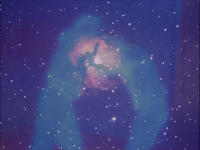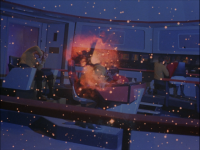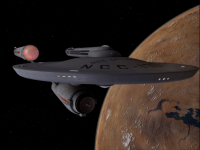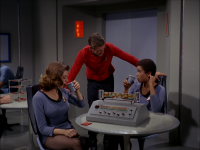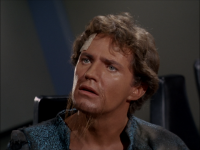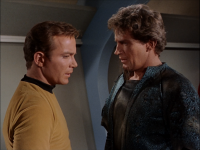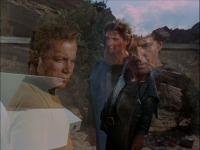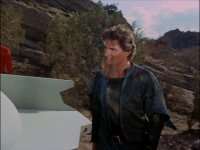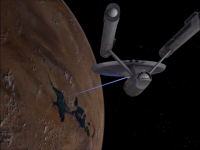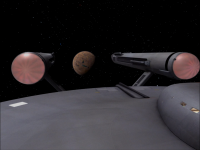Star Trek: The Original Series — 1x27 — The Alternative Factor
Synopsis
An alien being fights himself between two realities.
Filler rating: bad filler
If you skip only one episode of all of Star Trek, let it be this one.
Remarkable scenes
- Just when you think the technobabble and bad science can't get any worse, it gets worse. All through the episode.
Review
The Alternative Factor is an overwrought story in which the fate of two entire universes hangs in the balance over what amounts to little more than an incoherent stream of technical nonsense vomited at the screen by nearly every character. Vague, half-assed references to parallel universes, time travel, dilithium crystals, and antimatter get strewn about the dialog as if they somehow constitute a satisfactory explanation for the incessant glowing, psychedelic flashing, screeching, and noisy interludes which mightily assault your visual and auditory senses every few minutes. Production quality on Star Trek was never something to write home about, but this episode's is unforgivable.
But even with better production quality, there would be no saving the science in this story. The most incoherent scene is when after a lengthy discussion filled with pseudoscientific reasoning, Kirk and Spock deduce that the two Lazari must be matter/antimatter opposites from parallel universes. They further reason that their cosmic battling is what's causing the universe to occasionally "wink out" because an antimatter Lazarus coming into contact with a matter Lazarus would, they surmise, destroy both universes. Except for the pesky fact that that makes no sense at all and it isn't even consistent with what appears on screen.
Assuming for the moment that it's possible for a parallel universe made up entirely of antimatter to exist and that a man from an antimatter universe and a man from a matter universe could ever come in contact with each other via some means similar to what's depicted in this episode, then the two men in question would most certainly not enter into some sort of cosmic psychedelic wrestling match as this episode depicts. Instead they would instantly annihilate each other. Moreover, their mutual annihilation would not destroy any universes, let alone two. Their mutual annihilation would not likely even destroy a single planet, seeing as how planets like Earth have withstood repeated asteroid impacts which released considerably more energy than the ~90kg matter/antimatter explosion the two Lazari would yield.
A related problem is introduced when Kirk accidentally travels to the antimatter universe. Since Kirk is made up of matter, the very moment he came into contact with anything from the antimatter universe, he and it should have instantly annihilated one another. And while we're on the subject of the episode's bad science, Spock mentioned that he used the ship's dilithium crystals to localize a source of radiation on the planet. Setting aside the fact that that line makes no coherent sense at all, Spock later contradicts it entirely by saying that the ship's instruments cannot see the radiation at all; a statement which by itself doesn't make a lot of sense because the radiation source is visible to the naked eye. Do none of their sensors measure visible light?
As if the bad science in this episode weren't enough, the actual storytelling is abysmal. Once again we revisit Star Trek's tried and true cliche in which the mystery guest of the week fails to adequately explain what's going on despite repeated direct, pointed questioning. We don't want to let the plot move too quickly now, do we! There is some legitimate dramatic appeal in the idea behind a story about two identical men seeking to destroy one another, but whatever potential there is in the idea drowns under the weight of bad writing, bad science, bad production quality, and bad acting.
The climax of absurdity is Kirk's final line, "What of Lazarus? What of Lazarus?" Uttered in a fashion intended to be thoughtful and reflective, the line is in fact overwrought and laced with false profundity, much like the rest of the story. I didn't think it was possible for an episode of Star Trek to be worse than Miri, but here it is folks. Do yourself a favor and skip this one.
